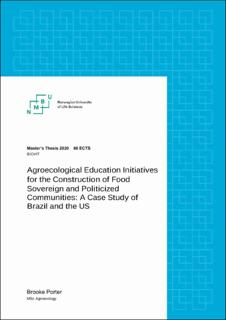| dc.contributor.advisor | Francis, Charles | |
| dc.contributor.author | Porter, Brooke | |
| dc.date.accessioned | 2021-02-01T13:42:15Z | |
| dc.date.available | 2021-02-01T13:42:15Z | |
| dc.date.issued | 2020 | |
| dc.identifier.uri | https://hdl.handle.net/11250/2725609 | |
| dc.description.abstract | The following work is a reflection on the design and implementation of the Bay Area Farmer Training program (BAFT) located in California USA and SERTA’s Agroecology training program located in Pernambuco Brazil, both of which teach agroecology using pedagogies rooted in humanistic values, social justice/decolonial frameworks, popular education and liberatory experiences. The following research outlines the participatory pedagogical philosophies and practices implemented within these programs, while providing examples of how their curricula manifest in praxis. In order to cultivate a paradigm shift within the food system, BAFT and SERTA exemplify the ways in which the social, ecological, and political dimensions of agroecology can be woven into education initiatives, in order to train the next generation of agroecologists with the technical skills needed to foster integrated food and farming system. | en_US |
| dc.language.iso | eng | en_US |
| dc.publisher | Norwegian University of Life Sciences, Ås | en_US |
| dc.rights | Attribution-NonCommercial-NoDerivatives 4.0 Internasjonal | * |
| dc.rights.uri | http://creativecommons.org/licenses/by-nc-nd/4.0/deed.no | * |
| dc.title | Agroecological Education Initiatives for the Construction of Food Sovereign and Politicized Communities: A Case Study of Brazil and the US | en_US |
| dc.type | Master thesis | en_US |
| dc.description.version | submittedVersion | en_US |
| dc.subject.nsi | VDP::Social science: 200 | en_US |
| dc.description.localcode | M-AE | en_US |

